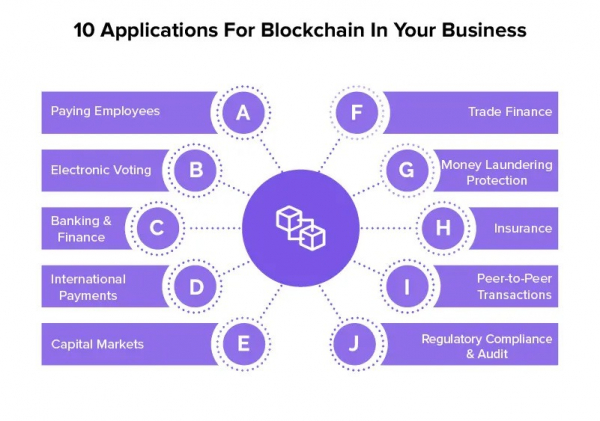Empowering Your Business with Blockchain: Implementation Insights
- by B2B Desk 2024-07-10 09:43:46
Blockchain Technology was primarily developed to serve the needs of digital currency trading. Yet, the technologically adept society quickly discovered that blockchain technology has the potential to empower businesses.
Implementing blockchain has the capability to increase efficiency, trust, and transparency in everyday transactions. Due to this, key players in the industry are currently strategizing essential initiatives for their companies. Blockchain technology is rapidly expanding across various sectors and has become an integral part of companies' evolution.
Refer to this blockchain guide to understand the implementation of blockchain technology and the complete development process.
How to Implement Blockchain for Business?
Blockchain technology benefits businesses by enabling seamless transactions between entities. With distributed ledger technology, participants can access information simultaneously, enhancing efficiency, reducing friction, and fostering trust. Moreover, blockchain facilitates rapid scalability and customization of solutions for businesses.
What advantages can Blockchain bring to your company?
In business, trust and benefits are closely intertwined. Blockchain, often labeled as a "trustless" system, might seem paradoxical initially. However, in this context, "trustless" refers to a decentralized network where transactions are verified and recorded independently, without intermediaries. Cryptographic algorithms guarantee data integrity, creating a secure and transparent environment. Embracing blockchain's trustless design equips businesses with enhanced security and efficiency, empowering them to excel in today's dynamic digital landscape.
Blockchain offers significant advantages over traditional databases in everyday operations. Let's delve into a few of them.
Automation
By automating processes with blockchain, operations become faster and more streamlined, reducing the need for manual intervention. This enhances your business's efficiency significantly. Blockchain and smart contracts eliminate the complexities of intermediaries, removing delays in contract verification, enforcement, and background checks. BPM software can automate tasks seamlessly with this innovative technology, saving considerable time and effort. Embracing automated processes like these ensures your business thrives and operates more efficiently.
Tokenization
Tokenization in blockchain involves converting real-world assets into digital tokens, which offers advantages such as enhanced liquidity, fractional ownership, and automated transactions.
For instance, in conventional finance, artwork tokenization encounters obstacles like limited liquidity, restricted investor access, and lengthy transaction times. With blockchain-based tokenization, artworks can be divided into tokens that are tradable, broadening investor participation and facilitating quicker, more efficient transactions.
Security
The IBM Data Breach Report for 2022 raised concerns by pointing out that a significant 83% of organizations faced multiple data breaches. This underscores the growing risk to sensitive information and underscores the critical need for strong cybersecurity measures. In conventional business settings, security issues such as data breaches, unauthorized access, and fraudulent activities are exacerbated by centralized systems.
Decentralized Network
In traditional centralized business models, challenges like inefficiency, single points of failure, and issues with transparency and trust are prevalent. However, decentralization in blockchain technology eliminates the need for a central authority. This allows transactions to happen directly between parties, speeding up operations and reducing delays. Such a streamlined process leads to enhanced efficiency and reduced operational costs, as intermediaries and their associated fees are eliminated. Transitioning your business to a decentralized network with the assistance of a blockchain app development company can provide greater security and efficiency.
What are the Steps to Implement Blockchain Technology
Here are the essential steps in implementing blockchain technology:
Determine the Use Case
The initial step involves identifying the issue or opportunity that you intend to tackle using blockchain technology. Identifying the most suitable use case for blockchain is crucial due to the variety of options available.
Assemble a Team
After identifying the use case, you will have to put together a group of specialists or opt for the blockchain development company to assist in executing the solution. Developers, business analysts, and project managers are all essential members of this team.
Choose the Right Platform
There are numerous blockchain platforms to choose from, so it is crucial to select the one that aligns most with your specific needs. When deciding, make sure to take into account factors like cost, scalability, and performance.
Develop the Solution
After selecting a platform, you can start creating the solution. Developing and programming the smart contracts for use on the blockchain will be part of this procedure.
Test and Deploy
Prior to deploying your solution on the mainnet, it is crucial to thoroughly test it on a testnet. This will assist in verifying that everything is functioning correctly prior to going live. After testing, you can implement your solution on the mainnet.
Monitor and Optimize
Even once your solution is in place, you must continue to closely monitor it to make sure it is functioning as anticipated. You might also have to adjust and optimize periodically as the requirements of your business evolve.
By following these steps, you can ensure that your blockchain implementation is successful.
Challenges Faced in Implementing Blockchain
Complex User Interface
Not all of your customers may be knowledgeable about technology. Using a specific group of technologies could pose a challenge for them. Having a system that is both straightforward and attractive will draw in the largest possible customer base.
Lack of Scalability
Scalability remains a significant hurdle in the blockchain sector, despite various proposed methods to enhance scalability. Blockchain acts as a bridge for the exchange and engagement between the blockchain system, potentially addressing concerns with scalability.
Poor Speed
The speed of transaction processing, known as Transaction Processing Speed (TPS), is once again a significant obstacle that impedes the wider acceptance of blockchain technology in the business world.
Security Problem
If the blockchain technology is not adequately encrypted, it is easily exploited by hackers. It is a significant challenge that many organizations integrating blockchain technology currently encounter.
Lack of Skilled Blockchain Experts
The blockchain sector faces a severe shortage of proficient and gifted blockchain developers. Nevertheless, medium-sized and big-sized firms are currently providing attractive perks in order to attract and keep skilled blockchain professionals.
FAQs
Q. What is a core aim of blockchain for business implementations?
A. What is a Core Aim of Blockchain for Business Implementations? Many companies use blockchain to rapidly scale up and out their solutions and build more robust processes and financial models. In the modern world, there are 10,000+ cryptocurrency systems running in the technology.
Q. Can I create my own blockchain?
A. You can take the assistance of our cryptocurrency exchange development company to build your own blockchain network. Supply chain, banking, real estate, and gaming are all industries where blockchain technology may help.
Q. What is the main goal of blockchain?
A. Blockchain helps in the verification and traceability of multistep transactions needing verification and traceability. It can provide secure transactions, reduce compliance costs, and speed up data transfer processing.
Q. How blockchain is used in business?
A. Blockchain for business is built on a shared, immutable ledger that is permissioned to increase efficiency among trusted partners. This enables businesses to transact more smoothly and efficiently.
Also Read: MakeMyTrip Business Model
POPULAR POSTS
The Agentic Revolution: Why Salesforce Is Betting Its Future on AI Agents
by Shan, 2025-11-05 10:29:23
OpenAI Offers ChatGPT Go Free in India: What’s Behind This Big AI Giveaway?
by Shan, 2025-10-28 12:19:11
Zoho Products: Complete List, Launch Years, and What Each One Does
by Shan, 2025-10-13 12:11:43
Arattai vs WhatsApp: Which Messaging App Should You Choose in 2025?
by Shan, 2025-10-10 11:55:06
Top Buy Now Pay Later (BNPL) Apps for Easy Shopping in 2025
by Shan, 2025-09-22 10:56:23
iPhone 17 Sale in India Begins: Full Price List, Launch Offers and Store Availability
by Shan, 2025-09-19 12:00:45
Apple September 2025 Event Recap: iPhone 17, iPhone Air, Apple Watch Series 11, and India Pricing Revealed
by Shan, 2025-09-10 09:55:45
RECENTLY PUBLISHED

Loan EMIs to Drop as RBI Slashes Repo Rate - Full MPC December 2025 Highlights
- by Shan, 2025-12-05 11:49:44

Pine Labs IPO 2025: Listing Date, Grey Market Premium, and Expert Outlook
- by Shan, 2025-11-05 09:57:07

Top 10 Insurance Companies in India 2026: Life, Health, and General Insurance Leaders Explained
- by Shan, 2025-10-30 10:06:42

Best Silver Investment Platforms for 2025: From CFDs to Digital Vaults Explained
- by Shan, 2025-10-23 12:22:46

Zoho Mail vs Gmail (2025): Which Email Platform Is Best for Businesses, Startups, and Students?
- by Shan, 2025-10-09 12:17:26

PM Modi Launches GST Bachat Utsav: Lower Taxes, More Savings for Every Indian Household
- by Shan, 2025-09-24 12:20:59




 Subscribe now
Subscribe now 